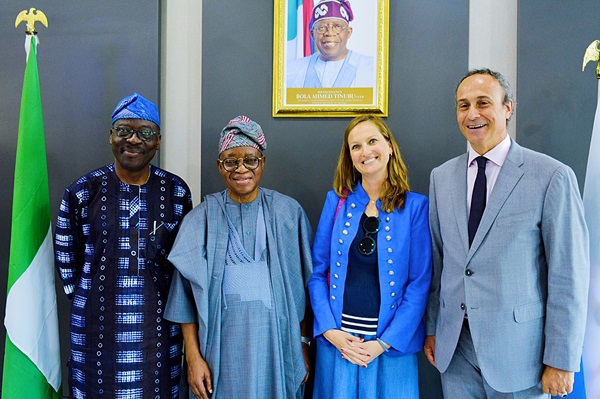
The Minister of Marine and Blue Economy, Adegboyega Oyetola, on Wednesday welcomed the French Ambassador to Nigeria, His Excellency Marc Fonbaustier, in Abuja, in a high-level meeting aimed at strengthening maritime and diplomatic ties between the two nations.
The visit came at a critical time as Nigeria ramps up its campaign for election into Category C of the International Maritime Organisation (IMO) Council. During the bilateral talks, Oyetola strongly advocated for France’s support for Nigeria’s bid, emphasising the country’s leadership role in maritime safety and regional ocean governance.
Ambassador Fonbaustier was accompanied by political counsellor at the French Embassy in Nigeria, Alice Ellenbogen. Their visit to the ministry was part of ongoing preparations for the 2025 World Oceans Day celebrations and the 3rd United Nations Ocean Conference (UNOC3), scheduled to take place in Nice, France, from June 8 to 13, 2025. Oyetola is expected to lead the Nigerian delegation to the global event on behalf of President Bola Tinubu.
In his remarks, Oyetola outlined Nigeria’s strategic position as a key maritime nation in West and Central Africa and a vital gateway to the Gulf of Guinea. He stressed that Nigeria’s election into Category C of the IMO Council would amplify Africa’s voice in global maritime governance and allow Nigeria to contribute more directly to shaping international maritime policies and regulations.
“France’s endorsement will be invaluable to our efforts,” the minister said. “Nigeria has made significant strides in securing our maritime domain, improving regional cooperation and aligning with international best practices. Being part of the IMO Council will further empower us to support global initiatives aimed at promoting maritime safety, sustainability and security.”
The minister also shared developments on Nigeria’s newly approved National Policy on Marine and Blue Economy, recently endorsed by the Federal Executive Council. The policy, he explained, provides a strategic framework for sustainably harnessing Nigeria’s marine resources, stimulating economic development and protecting the environment. He noted that the policy aligns with global targets such as the Sustainable Development Goal 14 (SDG 14), which focuses on conserving and sustainably using ocean and marine resources.
Oyetola highlighted recent achievements in maritime security, particularly the success of the Deep Blue Project and improved coordination among Nigerian security and regulatory agencies. These efforts, he said, have drastically reduced piracy and armed robbery incidents in the Gulf of Guinea, making it a safer passage for international maritime trade.
He expressed optimism that Nigeria’s commitment to global maritime safety would be recognised and rewarded with a seat at the IMO Council. “Our Gulf of Guinea is now a significantly safer corridor thanks to proactive strategies and investments in security infrastructure. This positions us as a dependable partner in ensuring the safety of international waters,” he added.
The meeting also touched on Nigeria’s preparations for the 3rd United Nations Ocean Conference, which will be co-chaired by France and Costa Rica. Building on previous editions in 2017 and 2022, the upcoming conference will focus on “Accelerating action and mobilising all actors to conserve and sustainably use the ocean.”
Oyetola reaffirmed Nigeria’s readiness to actively participate and contribute to the conference, highlighting the country’s deep commitment to ocean health, innovation in blue economy practices and international cooperation.
In his response, Fonbaustier lauded Tinubu’s decision to delegate Oyetola to lead Nigeria’s participation at UNOC3, describing it as a testament to Nigeria’s dedication to global maritime affairs. He welcomed Nigeria’s growing role in marine sustainability and expressed optimism about stronger bilateral cooperation in marine security, economic development and environmental protection.
The meeting underscores Nigeria’s intensified maritime diplomacy and the importance of international collaboration ahead of global efforts to chart a sustainable future for the world’s oceans.

